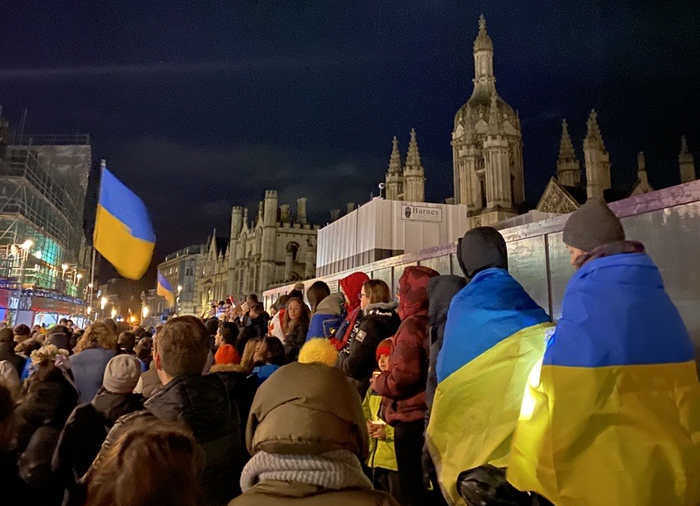The Cambridge engineer keeping Ukraine warm, one window at a time
Harry Blakiston Houston’s ingenious windows make war-damaged houses habitable again. Now, he’s got his sights on insulating the whole of Ukraine

When Russian forces leave a Ukrainian city or town, life there is forever changed. They leave huge craters in the roads, landmines in the long grass, and millions of broken windows. After Biotechnology PhD student Harry Blakiston Houston learned about the latter, he knew he could help. His solution? Inventing a new type of window that can take a near-freezing room and make it warm and comfortable. In just a few months, he’s installed 2,000 of them across Ukraine.
Harry paused his studies at Hughes Hall last December to travel to Ukraine with a small team of engineers, and they were shocked by the living conditions they found there. Harry tells me that the Ukrainians they have been helping “have basically nothing left”, and that they try to keep warm in any way they can, replacing bomb-shattered windows with shower curtains, or jamming teddy bears into bullet holes in a futile attempt to stop the wind whistling through.
“There was an old woman in Mykolaiv, in southern Ukraine, who had been sleeping in her bathtub for two months because it was the warmest place in her house,” Harry recounts. But after he installed his innovative windows, “the house was immediately warmer and lighter”, allowing the elderly woman to return to “some kind of normality”. That’s when the team first realised, “We’re on to something here.”

Harry’s four-layered windows use readily available materials — polyethylene, PVC piping, pipe insulation and duct tape — and are simple to build and install. Harry points out that while “glass shatters” and “wood splinters and doesn’t let light in”, his windows don’t shatter when hit by shockwaves, and cost just £12 each to build. “There is nothing else available today that does as good a job as what we’ve got.” Through ads on local Facebook groups in Ukraine, social media channels, radio publicity and even lists of affected areas written by the Ukrainian government itself, Harry and the team can quickly find the homes that need their windows the most, and make them habitable again.
“Putin’s war is about trying to make people in Ukraine cold and miserable”
“Part of Putin’s war is about trying to make people in Ukraine cold and miserable [...] It’s about breaking their resolve to actually continue defending themselves.” Insulate Ukraine are fighting this tactic on the ground, and with a clear goal in mind. “We intend to have hubs across Ukraine from where we can replace any shattered window with our solution within 24 hours by simply providing the required equipment.” By the end of the year they aim to install 50,000 windows in liberated areas — an intimidating target which they can’t meet without help.
Harry reveals, “we have our eyes on corporate partners [...] to insulate entire cities, entire villages, entire towns.” Individual donations, like the £500 donation from Queen’s College JCR, help buy the building materials; Insulate Ukraine have raised nearly $100,000 so far. Even if they meet their target of 50,000 windows, there are an estimated 10 million windows in liberated areas of Ukraine that need fixing. But Harry is singularly motivated to get the job done.

For Harry, this project stems from “an interest in tinkering” that comes not from his Biotechnology studies, but from his upbringing on a farm in Northern Ireland. Harry has always tried to find ways to apply his skills in the real world; he took a break from his undergraduate degree at Bristol to develop a “privacy-first phone app”. Harry is also motivated by his faith. He regularly takes time to pray for the Ukrainian people he helps — for him, faith provides “a compass for life.”
We often think of Cambridge University as a bubble, and this certainly has some truth to it. But with St Catharine’s student Nikolai Nizalov operating supply drones on the Ukrainian border, and Danny Mykhaylyuk (also St. Catharine’s) sending thousands of pounds of equipment to Ukraine, Harry is not the only Cambridge student who has stepped far outside the safety of the university to help Ukrainians in need.
Harry and the team keep a journal of their experiences, and, above all else, the human connections they have made are what stand out through their writing. They have met countless mothers who have lost sons to the war and yet continue to play the role of mother to everyone they can. In the journal, Harry recounts meeting one woman, Dasha, whose flat had an air temperature of 0°C before he replaced her windows. He writes, “It is difficult to comprehend the emotional lift one would feel when a stranger turns up and makes one feel physically warmer and cared for. As Dasha showed us out, she thanked us, wiping away tears from her eyes.”
 News / Cambridge students set up encampment calling for Israel divestment6 May 2024
News / Cambridge students set up encampment calling for Israel divestment6 May 2024 News / Cambridge postgrad re-elected as City councillor4 May 2024
News / Cambridge postgrad re-elected as City councillor4 May 2024 News / Some supervisors’ effective pay rate £3 below living wage, new report finds5 May 2024
News / Some supervisors’ effective pay rate £3 below living wage, new report finds5 May 2024 Fashion / Class and closeted identities: how do fits fit into our cultures?6 May 2024
Fashion / Class and closeted identities: how do fits fit into our cultures?6 May 2024 Features / Cambridge punters: historians, entertainers or artistes? 7 May 2024
Features / Cambridge punters: historians, entertainers or artistes? 7 May 2024






